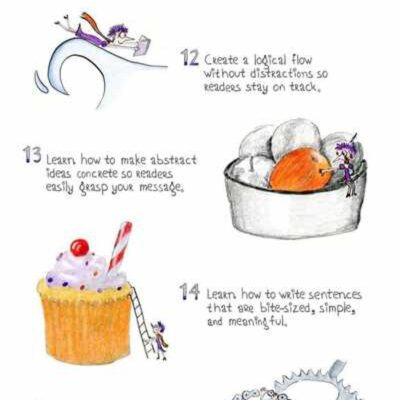
As a writer, it is important to constantly work on improving your skills. Whether you are writing fiction, nonfiction, academic essays, or marketing copy, good writing can open doors and help you establish your brand as a writer. However, becoming a better writer is not an easy process. It requires practice, dedication, and a willingness to learn and grow. In this article, we will guide you through 10 steps that will help you improve your writing and become a more effective communicator.
The first step to becoming a better writer is to know your purpose. Before you start writing, think about why you are writing and what you want to achieve with your words. Are you trying to inform, entertain, persuade, or simply share your thoughts and experiences? Understanding your purpose will help you stay focused and ensure that your writing serves its intended goal.
Once you know your purpose, it is important to know your audience. Different readers will have different expectations and preferences, so it’s crucial to tailor your writing to their needs. Consider factors such as their age, interests, background, location, and level of knowledge on the topic. This will help you choose the right tone, style, and level of detail to engage and captivate your readers.
Next, it’s time to work on your writing skills. One of the best ways to do this is by reading. Read widely and read often. Explore different genres and mediums. Pay attention to the techniques and strategies that other writers use. Take note of the words they choose, the structure of their sentences, and the way they create vivid images and stories. Reading will not only expose you to different writing styles, but it will also expand your vocabulary, improve your grammar, and enhance your overall writing abilities.
Another important step in improving your writing is to practice writing regularly. Set aside time each day or week to sit down and write. This could be in the form of journaling, blogging, writing short stories, or working on larger projects. The key is to make writing a habit and commit to it. The more you write, the more comfortable you will become with the writing process, and the better your writing will get.
In addition to practicing regularly, it is also beneficial to seek feedback on your writing. Share your work with trusted friends, family members, or writing groups. Ask for their honest opinions and constructive criticism. This feedback can help you identify areas where you can improve and give you fresh insights and perspectives on your writing. Don’t be afraid to revise and edit your work based on this feedback. Writing is a process, and multiple drafts are often needed to produce a polished and well-written piece.
Lastly, remember that writing is not a solitary activity. Collaborate with other writers, participate in workshops, attend conferences, or even consider interviewing experts in your field. Engaging with other writers and learning from their experiences can provide valuable insights and resources that can enhance your writing skills.
In conclusion, writing is a skill that can be developed and refined. By following the 10 steps outlined above – knowing your purpose, understanding your audience, reading, practicing regularly, seeking feedback, and engaging with other writers – you can start writing better. Don’t be discouraged by initial setbacks or challenges. Keep an open mind, be persistent, and remember that good writing takes time and dedication. So, start today and embark on your journey to becoming a better writer!
Follow These 12 Steps To Improve Your Writing Skills
Improving your writing skills is an important and ongoing process for any writer, whether your purpose is to write academic essays, nonfiction articles, or creative fiction stories. Good writing skills can help you effectively communicate your ideas, engage your readers, and establish your own unique writing style.
Here are twelve steps you can follow to improve your writing skills:
- Read: To become a better writer, it’s important to read extensively. Read books, articles, and stories of different genres and styles. By reading the works of other writers, you can absorb their writing techniques, learn new words, and broaden your understanding of the craft.
- Write regularly: Practice makes perfect, and writing is no exception. Make it a habit to write every day, even if it’s just a few sentences. The more you write, the better you will become at expressing your thoughts and ideas in written form.
- Develop your own voice: Find your unique writing style and voice. Experiment with different writing techniques, and don’t be afraid to let your personality shine through your writing. The more authentic and genuine your writing is, the more engaging it will be to your readers.
- Learn from feedback: Seek feedback from others, such as fellow writers, mentors, or writing groups. Listen to their suggestions and critiques, and use them to improve your writing. Constructive feedback can help you identify areas for improvement and refine your writing skills.
- Understand your audience: Consider who your target audience is and tailor your writing to their needs and interests. Whether you’re writing for a specific publication, marketing purposes, or personal expression, understanding your audience will help you communicate your message effectively.
- Practice different forms of writing: Try your hand at writing different forms of prose, such as short stories, essays, or nonfiction. Each form requires different skills and techniques, and by practicing different forms, you can broaden your writing abilities.
- Research and gather information: Before writing, gather information from credible sources to ensure that your writing is accurate and well-informed. This is particularly important when writing nonfiction or academic pieces. Use reliable sources and cite them properly.
- Stay organized: Develop a writing process that works for you. Create outlines, use mind maps, or have a structured plan in place before starting a writing project. This will help you stay focused, organized, and efficient throughout the writing process.
- Embrace revision: Writing is a process, and revision is a crucial part of it. Be open to revising and editing your work. Reread your writing with a critical eye, and make necessary changes to improve clarity, coherence, and overall quality.
- Use vivid language and imagery: To make your writing more engaging, use vivid language and descriptive imagery. Paint a picture with your words, engage the senses, and evoke emotions in your readers. This will make your writing more memorable and impactful.
- Write with purpose and clarity: Be clear about the purpose of your writing. What do you want to achieve with your words? Ensure that your writing serves a purpose and conveys your message effectively. Avoid unnecessary fluff or ambiguity.
- Never stop learning: Writing is a lifelong journey of learning and growth. Continually seek opportunities to learn and improve your writing skills. Attend writing workshops, take online courses, or read books on writing. The more you invest in your craft, the better you will become as a writer.
By following these twelve steps, you can improve your writing skills and become a more confident and effective writer. Remember, writing is a continuous process, so don’t be too hard on yourself. Practice regularly, stay open to learning, and enjoy the beautiful journey of self-expression through words.
Know your medium and its purpose
When it comes to writing, it’s important to know what medium you’re working in and understand its purpose. Each medium has its own set of rules and requirements, and being aware of them can help you produce better written work.
If you are writing prose, whether it’s a short story, a novel, or an essay, the rules and expectations are different than if you were writing for an academic audience. Understanding the differences can help you tailor your writing to the specific medium.
For example, if you’re writing an academic paper, you should follow certain guidelines, such as including proper citations and conducting thorough research. On the other hand, if you’re writing a creative piece, you have more freedom to experiment with language and storytelling devices.
Knowing the purpose of your medium is also crucial. Are you writing to inform, entertain, or persuade? This will guide your writing and help you create a clear and impactful piece.
For nonfiction writing, the purpose is often to provide information or educate readers. In this case, you should focus on presenting the facts in a clear and concise manner. On the other hand, fiction writing is meant to entertain and engage readers, so you can be more creative with your storytelling and language.
To improve your writing, practice writing in different mediums. Start with shorter pieces and gradually work your way up to more complex forms. Read examples of well-written work in your chosen medium and learn from them.
Throughout the writing process, think about the purpose of your medium and how you can best achieve that goal. Consider your audience and their expectations. Are you writing for experts in a specific field or for a wider audience? This will help you adjust your tone and language accordingly.
In conclusion, knowing your medium and its purpose is essential for becoming a better writer. By understanding the requirements and expectations of the medium you’re working in, you can improve your writing skills and produce high-quality work that resonates with your readers.
Sources:
– “On Writing: A Memoir of the Craft” by Stephen King
– “The Elements of Style” by William Strunk Jr. and E. B. White
– Interview with a professional writer
Creative writing
Creative writing is the process of using words to create something new and unique. It is a form of writing that allows the writer to open their imagination and think outside the box. Creative writing can take many forms, such as short stories, fiction, prose, or even nonfiction essays. The purpose of creative writing is to engage readers and evoke emotions, whether it’s through a captivating story or thought-provoking information.
| 1. | First and foremost, it’s important to become a good writer by practicing writing regularly. Like any skill, writing improves with practice, so make sure to set aside time each day to write. |
| 2. | Learn from other writers and their works. Read books, stories, and essays written by successful authors. This will help you get a sense of different writing styles and techniques. |
| 3. | Think about the purpose and audience of your writing. Are you writing for yourself, as a form of self-expression, or are you writing for a specific audience? Understanding your purpose will help you tailor your writing accordingly. |
| 4. | Be open to feedback and constructive criticism. Share your work with others and listen to their suggestions. This will help you identify areas for improvement and strengthen your writing skills. |
| 5. | Follow a structured writing process. Start with brainstorming ideas, create an outline, and then write a draft. Revise and edit your work to ensure clarity and coherence. |
| 6. | Use vivid and descriptive language. Paint a clear picture in the minds of your readers by using sensory details and powerful imagery. |
| 7. | Experiment with different genres and mediums. Try your hand at writing poetry, scripts, or even marketing copy. This will help you expand your skills and become a versatile writer. |
| 8. | Know your audience and write with them in mind. Consider their interests, knowledge level, and reading preferences when crafting your piece. |
| 9. | Done reading? Now it’s time to start writing. You can start by writing a short story or a personal essay. The important thing is to get started and let your creativity flow. |
| 10. | Less is more. Don’t overwhelm your readers with unnecessary information or excessive details. Keep your writing concise and impactful. |
| 11. | Use imagery and metaphor to create vivid and memorable images in your writing. This will make your work more engaging and impactful. |
| 12. | Consider the location and setting of your story. Location can play a significant role in a story and provide a unique backdrop for your characters and events. |
| 13. | Remember that writing is a journey, and improvement comes with time and practice. Don’t be discouraged if your first attempts are not perfect. Keep writing and learning from your mistakes. |
| 14. | Use technology to your advantage. There are many online resources and writing tools available that can assist you in the writing process. |
| 15. | Don’t be afraid to take risks and try something new in your writing. Push the boundaries of your comfort zone and experiment with different styles and genres. |
| 16. | Finally, enjoy the process of creative writing. Let your imagination run wild and have fun with words. |
By following these steps and practicing regularly, you can improve your creative writing skills and become a more effective writer. Whether you’re writing for academic purposes or simply for personal enjoyment, the art of creative writing is a powerful tool that can be mastered with time and dedication. So open your mind, grab a pen, and start writing!
Creative nonfiction
Creative nonfiction is a form of writing that is less academic and more open to creative expression. It combines the storytelling techniques of fiction with the purpose of conveying factual information. Whether you’re writing essays, articles, or even a short story, creative nonfiction allows you to explore a topic in a more detailed and imaginative way.
One of the key steps to writing good creative nonfiction is to know your audience. You want to tailor your writing to the readers who will be engaging with your work. Consider the tone, language, and devices you use to effectively communicate your ideas and maintain the readers’ interest throughout.
Throughout the writing process, it’s important to think about the purpose and image you want to convey through your creative nonfiction. Is it to inform, entertain, or persuade your readers? By keeping this in mind, you can shape your writing and choose the most appropriate words and narrative techniques to achieve your desired effect.
In creative nonfiction, the location and setting often play an important role in the story. Describing the environment in a vivid and engaging way can help transport your readers and immerse them in the narrative. Consider adding details and sensory descriptions to create a more immersive reading experience.
Interviews can also be a valuable tool in creative nonfiction. Conducting interviews with experts, witnesses, or other relevant individuals can provide you with valuable insights and firsthand information to enhance your writing. Quotes and personal anecdotes can add credibility and depth to your work.
When writing creative nonfiction, it’s important to remember that you are still a writer. Your skills from fiction writing can be applied to creative nonfiction as well. By practicing and honing your writing skills, you can improve the overall quality of your creative nonfiction pieces. Don’t be afraid to experiment and try different techniques to find your own unique voice.
Throughout the creative nonfiction process, it’s important to remain open to feedback and constructive criticism. Seek out other writers or writing groups who can provide valuable insights and help you refine your work. By seeking feedback, you can continue to learn and grow as a writer.
In summary, creative nonfiction is a unique medium that allows you to blend elements of fiction and nonfiction. By following these steps and practicing your writing skills, you can become a better creative nonfiction writer and improve the quality of your work.
Marketing writing

Marketing writing is a skill that every writer should follow, whether they’re writing fiction, nonfiction, academic essays, or marketing copy. It is a creative form of writing that aims to promote a brand, product, or service through the use of persuasive and engaging words. In marketing writing, the writer needs to know their target audience, their needs, and their preferences to create content that resonates with them.
Here are some important steps to improve your marketing writing skills:
| 1. | Know your audience: Understand who you are writing for and tailor your writing to their preferences. This will help you create content that is engaging and relevant to your target audience. |
| 2. | Understand the purpose: Identify the purpose of your marketing writing. Is it to inform, persuade, or entertain? Knowing the purpose will help you structure your content effectively. |
| 3. | Be creative: Marketing writing requires creativity to capture the attention of your readers. Use imaginative and compelling language to make your content stand out. |
| 4. | Focus on benefits: Highlight the benefits of your brand, product, or service. Show your readers how it can improve their lives or solve their problems. |
| 5. | Use storytelling: Incorporate storytelling elements into your marketing writing. People are more likely to connect with stories, and it can help create an emotional connection with your audience. |
| 6. | Keep it concise: Marketing writing is often short and to the point. Use a clear and concise writing style to deliver your message effectively. |
| 7. | Include relevant information: Provide enough information about your brand, product, or service to inform your readers, but avoid overwhelming them with excessive details. |
| 8. | Be open to feedback: Listen to feedback from your readers or colleagues and be willing to make changes to improve your marketing writing. |
| 9. | Practice regularly: Writing is a skill that improves with practice. Set aside time to write and experiment with different marketing writing techniques. |
| 10. | Study the masters: Read and analyze the marketing writing of successful writers and brands. Learn from their techniques and incorporate them into your own writing. |
By following these steps and practicing regularly, you can become a better marketing writer and effectively promote your brand, product, or service through your written content.
Academic writing
Academic writing is an essential skill to master for students in both high school and college. Whether you are writing essays, short stories, or even longer pieces of prose, it is important to know how to effectively communicate your ideas and thoughts in a structured and organized manner.
When writing academic papers, it is important to first understand the purpose of the task at hand. Academic writing is different from creative writing in that it is more focused on conveying information and presenting arguments rather than telling a story or entertaining readers.
To become a good academic writer, you need to learn how to think critically, analyze information, and present your ideas in a clear and concise manner. This involves conducting thorough research, gathering relevant evidence, and writing in a formal tone.
One of the first steps in the academic writing process is to open the document with a strong introduction. This should clearly state the purpose of your writing and provide a brief overview of what readers can expect to find in the essay or paper.
It is also important to carefully consider the structure of your writing. Academic essays are typically structured with an introduction, body paragraphs, and a conclusion. Each paragraph should have a clear topic sentence and provide supporting details and evidence.
In academic writing, it is important to back up your claims and arguments with credible sources. This can include scholarly articles, books, and other reputable sources. Make sure to properly cite any information or ideas that are not your own.
Throughout the writing process, it is also important to revise and edit your work. This includes checking for grammar and spelling errors, improving sentence structure, and ensuring that your writing flows smoothly.
Academic writing can seem daunting at first, but with practice and the right skills, you can become a more confident and proficient writer. Whether you are writing a detailed research paper or a short essay, following these steps and practicing your academic writing skills will help you improve your writing and effectively convey your message to your readers.
How to Become a Writer in 10 Easy Steps Detailed Version
Becoming a writer is a dream for many people, but it can seem like a daunting task. However, with the right guidance and practice, anyone can develop the skills necessary to become a successful writer. Whether you want to write fiction, nonfiction, or essays, it is important to learn the process and improve your writing skills. In this detailed version, we will go through 10 easy steps that will help you become a writer.
| Step 1: Know Your Purpose | Before you start writing, it is important to know why you want to write. Are you interested in creating stories, sharing information, or expressing yourself through prose? Knowing your purpose will help you stay focused throughout the writing process. |
| Step 2: Read, Read, Read | Reading is one of the best ways to improve your writing skills. Read books, articles, and blogs in your desired genre. Pay attention to the writing style, vocabulary, and structure. This will help you develop a good understanding of what works and what doesn’t. |
| Step 3: Practice Every Day | Writing is a skill that can be honed through practice. Set aside time each day to write, even if it’s just for a few minutes. The more you write, the better you will get. Use writing prompts or create your own topics to keep yourself motivated. |
| Step 4: Learn from the Best | Study the work of successful writers in your chosen medium. Look for interviews, articles, or books that provide insights into their writing process and techniques. Learn from their experiences and apply them to your own writing practice. |
| Step 5: Take Writing Courses | Enroll in writing courses or workshops to improve your skills. These courses will often provide valuable feedback from professional writers and give you the opportunity to learn about various writing techniques and styles. |
| Step 6: Find Your Voice | Discovering your unique voice is an important aspect of becoming a writer. Experiment with different writing styles, tones, and perspectives to find what feels authentic to you. Your voice will set you apart from other writers and make your work more engaging to readers. |
| Step 7: Write in Different Genres | Don’t limit yourself to just one genre. Try writing in different genres such as fiction, nonfiction, or poetry. This will help you explore different writing techniques and expand your creative abilities. |
| Step 8: Edit and Revise | Good writing is often the result of multiple rounds of editing and revising. After completing a draft, go through it with a critical eye and make necessary changes. Consider seeking feedback from editors or trusted friends to improve your work further. |
| Step 9: Build Your Brand | In today’s digital age, building your brand as a writer is essential. Create a website or blog where you can showcase your work. Engage with your readers through social media and establish yourself as an authority in your chosen genre. |
| Step 10: Never Stop Learning | Writing is a lifelong journey of learning and growth. Stay open to new ideas and constantly seek ways to improve your writing skills. Read books on writing, attend writing conferences, and connect with other writers to continue learning and refining your craft. |
By following these 10 easy steps, you can become a writer and fulfill your dream of creating stories, sharing knowledge, or expressing yourself through the written word. Remember that writing is a process, and with dedication and practice, you can become a skilled and confident writer.










